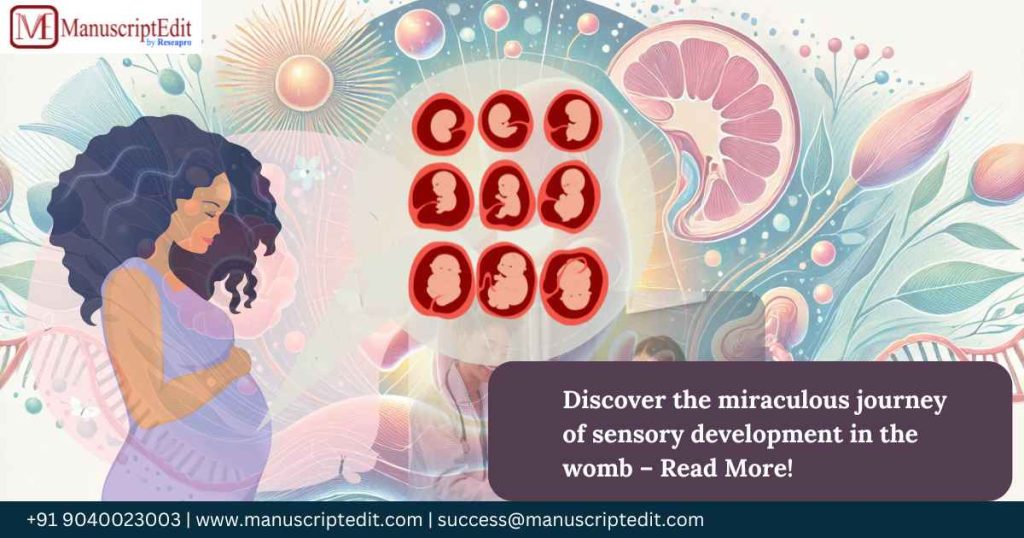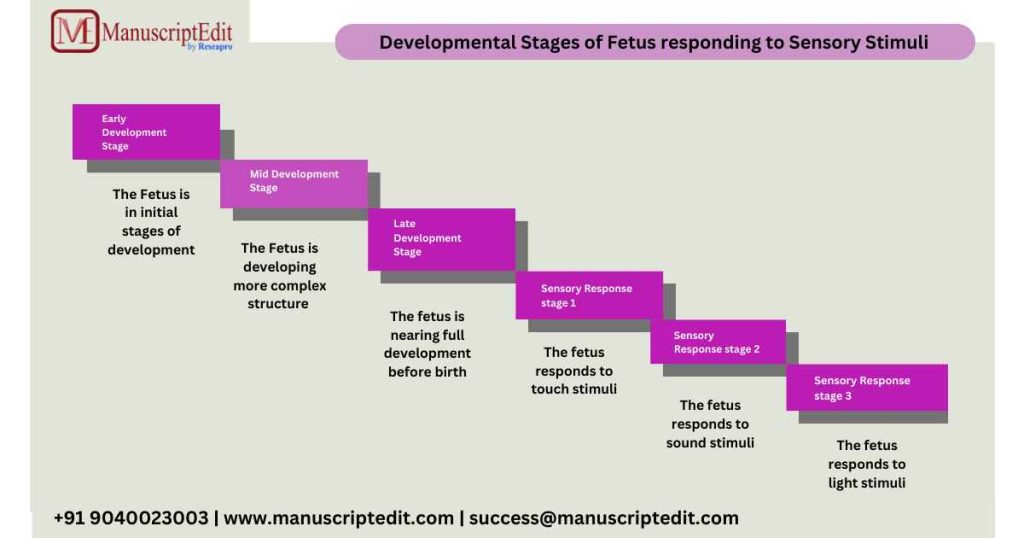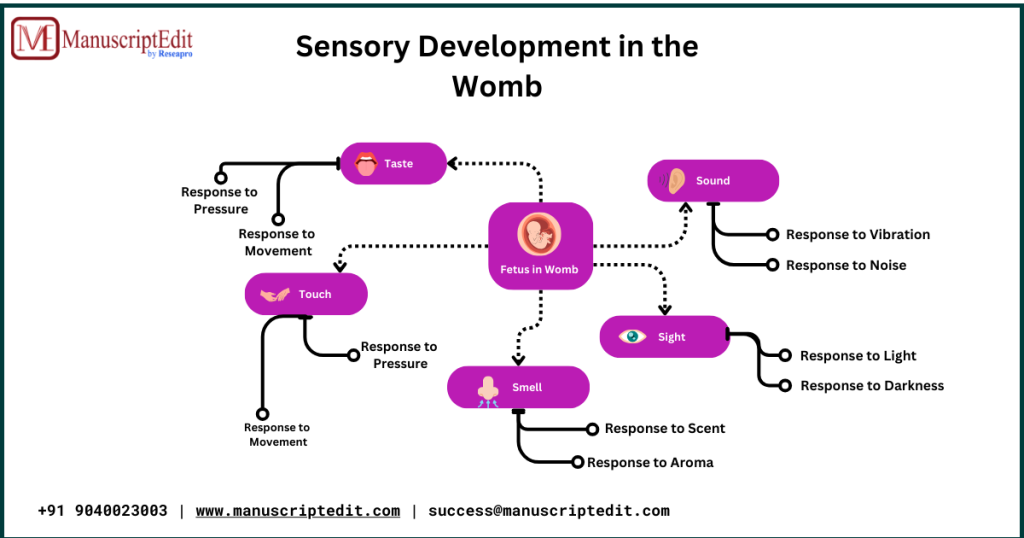|
Getting your Trinity Audio player ready...
|
Research conducted by Harvard University has shown that about 85% of babies prefer the songs and voices they were exposed to in the womb. Isn’t that interesting? It is almost hard to believe that the journey of developing senses starts before even birth-the womb becomes this vibrant place of exploration.

Let’s journey to see how that environment can become a simple, vibrant space for sensory exploration and discovery. – where the baby’s senses are honed through touch, sound, and light. In so doing, celebrate the wondrous world of fetal perception and development! From the soothing rhythm of a mother’s heartbeat to the soft sounds drifting in from outside, every experience plays an essential role in shaping an infant’s early life.
Join us on this insightful journey as we discover how touch, sound, light, and taste combine to create a baby’s first perceptions. You will be able to walk away with a better appreciation of the womb as a sensory playground and an insight into how such early experiences lay the groundwork for life that follows.
Do you know? In the 14-26 weeks of pregnancy, a fetus can start responding to outside sounds and might even prefer to listen to known voices. It has been studied that about 75% of pregnant women witness their babies reacting to the sound by the time they reach five months into pregnancy. More than 60 percent of the neural pathways related to sensory perception develop before one is born. That only serves to show just how essential this incredible period is. Fetal perception underscores the need for a loving pre-birth environment, highlighting human development’s amazing journey.

Do you know? In the 14-26 weeks of pregnancy, a fetus can start responding to outside sounds and might even prefer to listen to known voices. It has been studied that about 75% of pregnant women witness their babies reacting to the sound by the time they reach five months into pregnancy. More than 60 percent of the neural pathways related to sensory perception develop before one is born. That only serves to show just how essential this incredible period is. Fetal perception underscores the need for a loving pre-birth environment, highlighting human development’s amazing journey.

Science: Sensory Development in the Womb
The sense of touch develops quite early, around eight weeks of gestation. By about 12 weeks into pregnancy, the fetus responds to touch, particularly around the mouth and face. As the months pass, this sensitivity spreads to other body parts, creating a wonderful foundation for building reflexes and forming connections through touch after birth.
Do you know? At 32 weeks, a fetus may have a strong enough grip reflex to hold the umbilical cord. Some estimates are that nearly 90% of fetuses will respond to touch in a gestational period beyond the third month. According to the American Pregnancy Association, one of the earliest signs of neural connectivity is in these kinds of tactile responses.
Sound: Did you know that auditory development starts around 18 weeks? As the 28th week progresses, this excellent process becomes even more precise! Babies are submerged in a tapestry of sounds: their mother’s heartbeat, the soft sounds from her stomach, and voices around them. Excitingly, research shows that babies can recognize and respond to their mother’s voice, creating an even closer bond between the mother and child.
Quick Tip: Singing or conversing with your baby while still in the womb can foster an early auditory bond. Scientists have found that consistently exposing an infant to soothing sounds can reduce newborn stress by as much as 30%.
Light: Although the womb may be dark, it is very interesting to see that, even by the third trimester of pregnancy, the fetuses start to notice the contrasts between light and dark. This marvelous ability helps their visual systems prepare for the bright world they are soon to enter.
By 40 weeks, about 70% of fetuses turn their heads toward light shining through the mother’s abdomen. Studies also show that light exposure during pregnancy helps develop the visual cortex.
Taste and Smell: By about 13 weeks, taste buds begin to develop, meaning that the mother’s diet can influence the amniotic fluid’s flavor. This early exposure to a range of flavors may be important in determining food preferences later in life! In fact, one study found that babies exposed to flavors like carrots or garlic while in the womb were 36 percent more likely to like those flavors when they emerged into the world.
Did You Know? Infants who are exposed to garlic or vanilla before birth often come to love these flavors when they arrive in the world! In a fascinating study of 500 European mothers, researchers discovered that prenatal exposure to a range of tastes significantly increased a child’s preference for vegetables by an astonishing 42 percent.
The Influence of a Mother’s Surroundings
The health, nutrition, and emotional well-being of a mother during pregnancy play an essential role in the development of her fetus. For example, stress hormones can profoundly affect a baby’s sensory development, while a nutritious and balanced diet can introduce a delightful array of flavors. In a study involving 1,000 pregnant women, researchers examined how stress-reducing activities influenced their babies’ reactions to sensory stimuli once they entered the world.
The CDC reports that maternal stress can raise cortisol levels in amniotic fluid by 20%, affecting fetal brain development. On the bright side, mothers practicing mindfulness saw a 35% boost in fetal heart rate variability, a key sign of healthy brain development.
Valuable Tips for Expectant Women:
Stay active; gentle exercises such as yoga can stimulate your baby’s vestibular system.
Various Flavors can enrich the quality of the amniotic fluid surrounding your baby. •
Create a Harmonious Environment: Soft music and gentle conversations can foster the development of your baby’s auditory connections.
Why is fetal perception important?
There are many interesting ways to see how a baby’s senses grow. Simple things like talking or playing soft music can strengthen the bond between parents and their baby. Amazingly, if mothers regularly speak during pregnancy, their babies are 50% more likely to recognize their voices!
Health Monitoring: A change in the fetus’s behavior to stimuli might indicate critical developmental issues. Research indicates that fetuses with very weak sensory responses are at a 25% increased risk of developmental delays.
Preparation for Birth: Introduction of baby to familiar sounds and tastes can help the baby adjust to life outside the womb.
Inside the womb, a baby rests in a protective cocoon with a nurturing environment that gently stirs their senses to life. From the gentle caress of amniotic fluid to the soothing cadence of their mother’s voice, these moments create a crucial foundation for existence.
Are you ready to see the amazements of prenatal? Knowing these things helps you nurture your little one in the best way. Every choice you make today helps your baby in developing his sense and emotion. Do you want to know some more secrets for the enrichment of fetal development? Be it consultation, practical suggestions, or resources according to your gestation journey; we would love to connect with and support each other!
👶 Just like fetal sensory development, success in research is a step-by-step process. Let us help you build a strong foundation for your scholarly journey!
💡 Whether you need insights, editing, or publication strategies, Manuscriptedit is here to support your academic growth.
📞 Let’s collaborate on your next research milestone. Contact us today!
+91-904-002-3003 (IN) +91-923-730-4004 (IN) +1 (646)916-3476 (USA)



